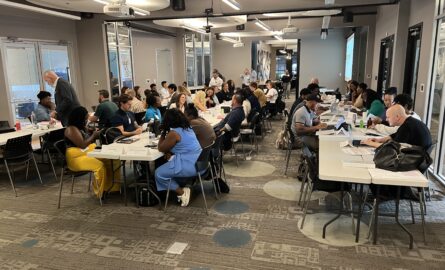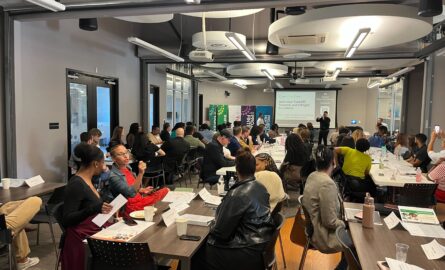In this episode of Friends of Project Healthcare…
Paul Rinne, Co-Founder and CEO of GripAble, joined host Eric Thrailkill to discuss the importance of engagement and data tracking to the success of rehabilitation, and the value unlocked in the “gamification” of therapy. They also explore the potential for reimbursement and cost savings for patient and provider, from hospital to home, and share GripAble’s efforts to scale their business as they expand into the U.S. Market.
“We believe we’re in a position where we can work with home health providers to improve home health ability,” Paul shared, “but then also generate evidence to the payers to say you should really be reimbursing this type of care at home.”
Paul received his PhD from the Imperial College in London where he also led Digital Healthcare and MedTech Innovation for over five years. His background as a research scientist focused on cognitive neurosciences led him to explore the relationship between physical and cognitive factors, and their impact on rehabilitation.
“We started to do a lot of research in physical and cognitive tracking at the same time,” Paul explained, comparing data sets for outcomes of Patients A & B, for example. “Patient A on the surface may look the same but actually had a significant impairment in their attention ability or their ability for memory, which would impact their ability to relearn movements.”
“And that’s really where I started to make my transition into doing world leading research in this field and how we started getting out of the research environment. From bench to bedside.”
GripAble is a hand-held device that connects to a motivating mobile therapy app through which patients can engage in fun, therapeutic programs, while therapists can assess their progress.
“How do you get that patient to actually do what the therapists asked ’em to do?,” Paul asked himself. The answer was to “gamify” the rehabilitation environment.
“The patient can get real-time feedback on what they’re doing. They can see, oh yeah, actually, I’m achieving a near term goal and I know it’s working towards my long-term goal,” he said. “And if you can give feedback in that moment, building on day by day, we can see progress.”
The smart device does more than just encourage and improve adherence for neuro rehabilitation. It also amasses significant datasets which AI/ML models can be trained to early predict complex neurodegenerative conditions and disorders. By collecting data and leveraging machine learning, the company aims to provide personalized interventions and predictive analytics.
“What subtle markers can we pick up from the sensors, from the information that we’re gathering, from our coaches with them, that if you just left them by themselves and a therapist turned up once a month to do a training session, what are we picking up on?”
By drilling down on a “more granular level” GripAble’s technology can begin to predict successful recovery but also potential drop-off, giving the therapist and even home health agencies an opportunity for intervention, ultimately improving patient outcomes and reducing readmissions.
“If there is a decrease in someone’s functional ability, their ability to brush their teeth, to look after themselves, that could result in some sort of event. Obviously a fall being a classic one,” Paul offered. “Someone needs to go see that individual before they end up back in hospital.”
Paul explained that’s where working with home health agencies becomes a win-win-win for the patient, provider and even the payer.
“We believe we’re at a sweet spot for that,” Paul said. “We’re in a position where we can work with home health providers to improve home health ability, but then generate evidence to the payers to say you should really be reimbursing this type of care at home.”
“Our biggest drive is from the home health agencies. They get the patient when they get home and once they’re home, their job is to keep them at home,” Paul explained. “So here’s an offering for home health agencies and providers to start working with their patients, improve patient satisfaction, improve certain outcomes that they are marked with by the payer.”
“The big leap that we have to make, that almost any digital healthcare software has to make,” Paul believes, “is how do you then engage with the payer themselves?”
Recently, Paul established the U.S. as his home base and is focused now on driving commercialization opportunities with GripABLE here in the States after his many successful and impactful implementations in the U.K.
A partnership with Medline, one of the largest distributors of rehabilitation products in America, GripAble aims to scale its platform and reach a wider audience.
“Where the American dream comes in for a company like ours is how do you get into this environment where you have a population that is 5, 6, 7 times bigger than the UK?” Paul said. “An environment that’s not just driven by do more for less, but it’s driven by if you can deliver more at a good value and improve your margins, then yes, we’re willing to invest with companies to achieve that.”
About Paul Rinne Dr Paul Rinne is Co-Founder and CEO/President of GripAble Ltd and GripAble Inc. He has held positions in the NHS and at Imperial College London, linking the medical, engineering and business schools to drive Medical Technology education and innovation. He achieved his PhD. in the field of neuroscience and technologies for rehabilitation. Paul has spent time working with both healthcare systems and start-ups in the US and UK, building global experience in innovations that deliver both patient outcomes and clear value propositions for both providers and payers.
Keep the Pulse, Friends!
LISTEN: “Follow” or “subscribe” to Friends of Project Healthcare on your favorite podcast platform.
REVIEW: Go to Apple Podcast at projecthealthcare.com/apple and leave a (hopefully) 5-star rating and creative review.
Friends of Project Healthcare Podcast
Brought to you by Nashville Entrepreneur Center



